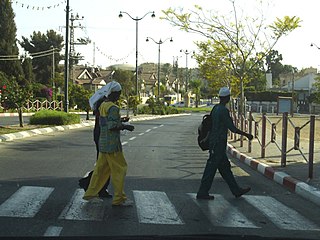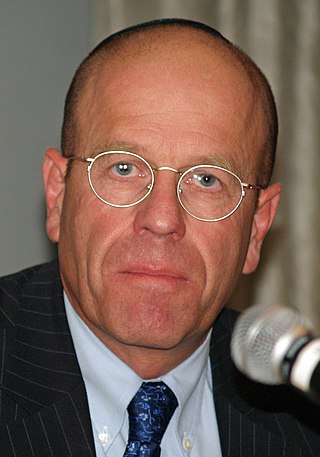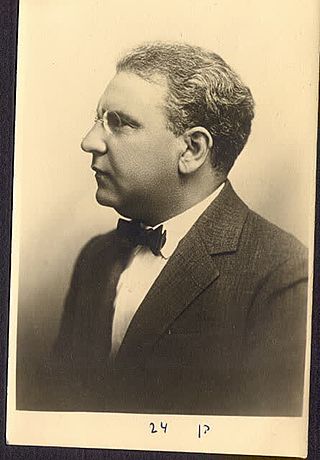
Judaism is an Abrahamic, monotheistic, and widely an ethnic religion. It comprises the collective spiritual, cultural, and legal traditions of the Jewish people, having originated as an organized religion in the Middle East during the Bronze Age. Contemporary Judaism evolved from Yahwism, the cultic religious movement of ancient Israel and Judah, around the 6th/5th century BCE, and is thus considered to be one of the oldest monotheistic religions. Religious Jews regard Judaism as their means of observing the Mosaic covenant, which was established between God and the Israelites, their ancestors. Along with Samaritanism, to which it is closely related, Judaism is one of the two oldest Abrahamic religions.

Zionism is a nationalist movement that emerged in the 19th century to enable the establishment of a homeland for the Jewish people in Palestine, a region roughly corresponding to the Land of Israel in Jewish tradition. Following the establishment of the modern state of Israel, Zionism became an ideology that supports the development and protection of the State of Israel as a Jewish state.

Messianic Judaism is a modernist and syncretic sect that considers itself Jewish. Many consider it a part of the Christian movement of evangelicalism.

Ashkenazi Jews, also known as Ashkenazic Jews or Ashkenazim, constitute a Jewish diaspora population that emerged in the Holy Roman Empire around the end of the first millennium CE. They traditionally spoke Yiddish and largely migrated towards northern and eastern Europe during the late Middle Ages due to persecution. Hebrew was primarily used as a literary and sacred language until its 20th-century revival as a common language in Israel.
Jewish religious movements, sometimes called "denominations", include diverse groups within Judaism which have developed among Jews from ancient times. Today in the west, the most prominent divisions are between traditionalist Orthodox movements and modernist movements such as Reform Judaism originating in late 18th century Europe, Conservative originating in 19th century Europe, and other smaller ones.

African Hebrew Israelites in Israel, officially known as the African Hebrew Israelite Nation of Jerusalem, is a spiritual community which is now mainly based in Dimona, Israel, whose members believe that they are descended from the Twelve Tribes of Israel. The community now numbers around 5,000. They came from a group of African Americans, many from Chicago, Illinois, who migrated to Israel in the late 1960s.
Jehuda Reinharz served as President of Brandeis University from 1994–2010. He is currently the Richard Koret Professor of Modern Jewish History and Director of the Tauber Institute for the Study of European Jewry at Brandeis. He is also the president and CEO of the Jack, Joseph and Morton Mandel Foundation. On September 25, 2009, Reinharz announced his retirement as President of Brandeis, but at the request of the Board of Trustees, he stayed on until a replacement could be hired. On January 1, 2011, Reinharz became president and CEO of the Jack, Joseph, and Morton Mandel Foundation.
Black Hebrew Israelites are a new religious movement claiming that African Americans are descendants of the ancient Israelites. Some sub-groups believe that Native and Latin Americans are descendants of the Israelites as well. Black Hebrew Israelites combine elements to their teaching from a wide range of sources to varying degrees. Black Hebrew Israelites incorporate certain aspects of the religious beliefs and practices of both Christianity and Judaism, though they have created their own interpretation of the Bible, and other influences include Freemasonry and New Thought, for example. Many choose to identify as Hebrew Israelites or Black Hebrews rather than Jews in order to indicate their claimed historic connections.

Yonatan Ratosh was the literary pseudonym of Uriel Shelach, an Israeli poet and journalist who founded the Canaanite movement.

Avraham "Avrum" Burg is an Israeli author, politician and businessman. He was a member of the Knesset, chairman of the Jewish Agency for Israel, Speaker of the Knesset, and Interim President of Israel. He was the first Speaker of the Knesset to have been born in Israel after its declaration of independence in 1948. A member of the Labor Party when he was a member of the Knesset, Burg announced in January 2015 that he had joined Hadash.

Mimouna is a traditional Maghrebi Jewish celebration dinner, that currently takes place in Morocco, Israel, France, Canada, and other places around the world where Jews of Maghrebi heritage live. It is held the day after Passover, marking the return to eating hametz, which is forbidden throughout the week of Passover.
Israeli Jews or Jewish Israelis comprise Israel's largest ethnic and religious community. The core of their demographic consists of those with a Jewish identity and their descendants, including ethnic Jews and religious Jews alike. Approximately 99% of the global Israeli Jewish population resides in Israel; yerida is uncommon and is offset exponentially by aliyah, but those who do emigrate from the country typically relocate to the Western world. As such, the Israeli diaspora is closely tied to the broader Jewish diaspora.
Hiloni, plural hilonim, is a social category in Israel, designating the least religious segment among the Jewish public. The other three subgroups on the scale of Jewish-Israeli religiosity are the masortim, "traditional"; datiim, "religious"; and haredim, "ultra-religious" ("ultra-Orthodox"). In the 2018 Israel Central Bureau of Statistics' survey, 43.2% of Jews identified as hiloni.
Revisionist Maximalism was a short-lived right-wing militant political ideology and Jewish militant ideology which was part of the Brit HaBirionim faction of the Zionist Revisionist Movement (ZRM) created by Abba Ahimeir.

The common definition of Zionism was principally the endorsement of the Jewish people to return to their homeland, secondarily the claim that due to a lack of self-determination, this territory must be re-established as a Jewish state. Zionism was produced by various philosophers representing different approaches concerning the objective and path that Zionism should follow.
Jewish fascism is a term that applies to Jewish political factions on the far-right wing of the political spectrum that have either actively associated themselves with or have been construed as engendering fascism.

The Jews or Jewish people are an ethnoreligious group and nation originating from the Israelites of the ancient Near East, and whose traditional religion is Judaism. Jewish ethnicity, religion, and community are highly interrelated, as Judaism is an ethnic religion, although not all ethnic Jews practice it. Despite this, religious Jews regard individuals who have formally converted to Judaism as part of the community.

Canaanism was a cultural and ideological movement founded in 1939 that reached its peak in the 1940s among the Jews of Mandatory Palestine. It has had significant effect on the course of Israeli art, literature and spiritual and political thought. Its adherents were called Canaanites. The movement's original name was the Council for the Coalition of Hebrew Youth or less formally, the Young Hebrews; Canaanism was originally a pejorative term. It grew out of Revisionist Zionism and had roots in European extreme right-wing movements, particularly Italian fascism. Most of its members were part of the Irgun or Lehi.

Hamagid, also known after 1893 as Hamagid LeIsrael, was the first Hebrew language weekly newspaper. It featured mostly current events, feature articles, a section on Judaic studies, and, in its heyday, discussions of social issues. Published between 1856 and 1903, it first appeared in Lyck, East Prussia and targeted Russian Jews, but was soon redistributed all over Europe and the Jewish world. Although it only had a peak circulation of 1,800 copies, it's primarily remembered as beginning the modern day Hebrew language press. It is hard to estimate its true readership, as in its era one copy would pass through many hands.

Haim Harari (Hebrew: חיים הררי (שניאור זלמן בלומברג was one of the founders of Tel Aviv.













